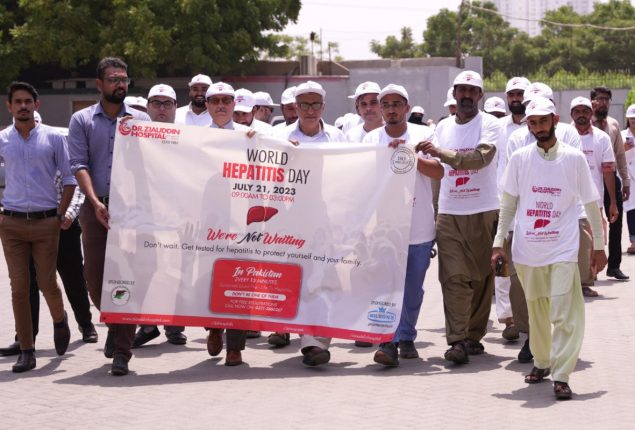PM expresses sorrow over loss of 12 lives in Rawalpindi
PM prayed to Allah Almighty to rest departed souls in peace. He...

5mln individuals carry hepatitis B virus in Pakistan
KARACHI: “It is our duty to raise awareness among the public about the importance of seeking treatment before the disease becomes a threat”, said Dr. Zulfiqar Dharejo, the Additional Director of the CDC Hepatitis Control Program Sindh.
He was speaking the audience as a chief guest at the awareness seminar to commemorate World Hepatitis Day, organized by Dr. Ziauddin Hospital.
The purpose of the event was to raise awareness about the global impact of hepatitis infections and the importance of early detection and prevention measures, knowledge about the disease, its transmission, and available treatment options, and shedding light on the pressing issue of viral hepatitis.
“Sindh government is actively engaged in providing free vaccines and treatments for hepatitis, and our relentless efforts to protect our nation and save lives. Rest assured, we are putting forth our best endeavors to safeguard our country from the impact of this disease”, Dr. Dharejo stated.
On this occasion, Prof. Dr. Abbas Zafar, Dean, Faculty of Health Sciences, Ziauddin University said that better treatment is possible only with early diagnosis. For this, it is important to consult a doctor for any unusual changes in yourself and urge everyone to get tested for the disease.
While highlighting the reasons for the spread of hepatitis Prof. Zaigham Abbas, Head of Department Hepatology and Gastroenterology, Ziauddin University said that Hepatitis B and C are mainly blood-borne diseases, spread by infected blood and body fluids. Transfusion of infected blood, using syringes or surgical equipment previously used by a hepatitis-positive patient, lack of sterilization facilities, and quackery are the main sources of spread. In Pakistan, an average person receives 10 injections per year, of which 90% are avoidable and remain non-essential.
While discussing the establishment of WHO, Dr. Khurram Baqai, Assistant Professor of Gastroenterology, Ziauddin University, highlighted that an estimated 4.5 million premature deaths could be averted in low- and middle-income countries by 2030 through the implementation of vaccination, diagnostic tests, medicines, and education campaigns. Globally, Pakistan bears the heaviest burden of hepatitis C, with a nationwide prevalence exceeding 5% (10 million cases), primarily concentrated in Punjab, followed by Sindh, KPK, and Balochistan.
Furthermore, in Pakistan, approximately 5 million individuals carry the hepatitis B virus (HBV) with a carrier rate of 2.5%. Notably, certain districts in upper Sindh, Southern Punjab, and Balochistan exhibit significantly higher prevalence rates than the national average.”
Catch all the Pakistan News, Breaking News Event and Latest News Updates on The BOL News
Download The BOL News App to get the Daily News Update & Follow us on Google News.